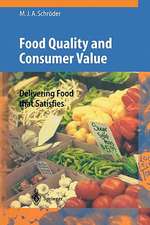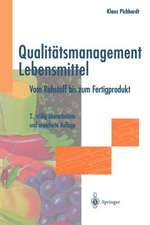Institutions as Conscious Food Consumers: Leveraging Purchasing Power to Drive Systems Change
Editat de Sapna Elizabeth Thottathil, Annelies Gogeren Limba Engleză Paperback – 29 aug 2018
Institutions as Conscious Food Consumersbrings together in-depth case studies from several of promising models of institutional food purchasing that aim to be more sustainable, healthy, equitable, and local. With chapters written by a diverse set of authors, including leaders in the food movement and policy researchers, this book:
- Documents growing interest among non-profit organizations and activists in institutional food interventions through case studies and first-hand experiences;
- Highlights emerging evidence about how these new procurement models affect agro-food supply chains; and
- Examines the role of policy and regional or geographic identity in promoting food systems change.
Preț: 898.73 lei
Preț vechi: 1262.48 lei
-29% Nou
171.97€ • 180.03$ • 142.30£
Carte tipărită la comandă
Livrare economică 29 martie-12 aprilie
Specificații
ISBN-10: 0128136170
Pagini: 350
Dimensiuni: 152 x 229 mm
Greutate: 0.47 kg
Editura: ELSEVIER SCIENCE
Public țintă
Supply Chain Specialists, Food Service Directors, Food Sales Managers, Food Brokers, Dietitians, and Procurement Specialists. Upper level undergraduate students in food science and public healthCuprins
Part I The Role of Institutions in Food Systems Change 1. Introduction: Institutions as Conscious Food Consumers 2. Trends in the Global Food System and Implications for Institutional Foodservice 3. Situating Institutional Foodservice in Agro-Food Value Chains: Overcoming Market Power and Structure with Values-Based Procurement
Part II Setting Purchasing Standards Through Policy 4. From Foodservice Management Contracts to U.S. Federal Legislation: Progress and Barriers in Values-Based Food Procurement Policies 5. The Good Food Purchasing Program: A Policy Tool for Promoting Supply Chain Transparency and Food System Change 6. From Navigating the Regulatory Environment to Designing a Good Food Supply for Institutions: Cases from Philadelphia
Part III Creating Shared Identity Using Place-Based Connections 7. Making Local Sourcing Standard Practice: Lessons from Michigan 8. Farm to Institution New England: Mobilizing the Power of a Region’s Institutions to Transform a Region’s Food System 9. Montana’s Beef-to-School Project: Making Connections to Enhance Local Agriculture 10. Institutional Markets Supporting Midsized Farms: A Case Study of Iowa
Part IV New Directions for Institutional Foodservice 11. Sustainable Food Purchasing in the Health Care Sector: From Ideals to Institutionalization 12. Bringing School Foodservice Staff Back in: Accounting for Changes in Workloads and Mindsets in K-12 Values-Based Procurement 13. Food Banks as Local Food Champions: How Hunger Relief Agencies Invest in Local and Regional Food Systems 14. Plant Proteins Move to Center-Plate at Colleges and Universities
Descriere
Institutions like schools, hospitals, and universities are not well known for having quality, healthy food. In fact, institutional food often embodies many of the worst traits of our industrialized food system, with long supply chains that are rife with environmental and social problems and growing market concentration in many stages of food production and distribution. Recently, however, non-profit organizations, government agencies, university research institutes, and activists have partnered with institutions to experiment with a wide range of more ethical and sustainable models for food purchasing, also known as values-based procurement.
Institutions as Conscious Food Consumers brings together in-depth case studies from several of promising models of institutional food purchasing that aim to be more sustainable, healthy, equitable, and local. With chapters written by a diverse set of authors, including leaders in the food movement and policy researchers, this book:
- Documents growing interest among non-profit organizations and activists in institutional food interventions through case studies and first-hand experiences;
- Highlights emerging evidence about how these new procurement models affect agro-food supply chains; and
- Examines the role of policy and regional or geographic identity in promoting food systems change.
Institutions as Conscious Food Consumers makes the case that institutions can use their budgets to change the food system for the better, although significant challenges remain. It is a must read for food systems practitioners, food chain researchers, and foodservice professionals interested in values-based procurement.




















